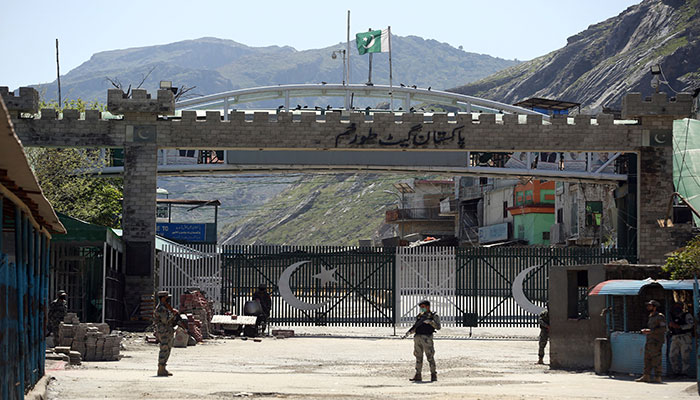Trade routes with Afghanistan will not be closed down
ISLAMABAD: Pakistan has carved out a plan to increase its market share in Afghanistan up to 60-65 percent and to this effect, the authorities after taking the GHQ on board, have finalised a trade and investment vision statement for the landlocked country, and have decided come what may, the trade routes between the two countries would not be closed down further.
While talking to The News, Adviser to the Prime Minister on Commerce and Investment, Abdul Razak Dawood, said in case of any subversive activities from the militants across the divide, it has been decided that the trade routes would not be made non-operational and trade would be carried on.
In the past, whenever any subversive activities took place in the bordering area, the trade routes were shut, owing to which the trading activities mostly stood still with a lot of damage to exports of the country to landlocked Afghanistan. More importantly, the previous regimes did not focus on increasing the exports, rather their policies had led to massive reduction in exports to Afghanistan.
Dawood said the country’s exports stood at $2.6 billion in 2010-11 that tumbled to $877 million but the government is now geared up to increase the exports to Afghanistan up to $1.2 billion in the current fiscal year.
However, during the first five months of the current year, exports to Afghanistan surged by 3.2 percent. Right now, Pakistan possessed 43 percent of Afghan imports.
In the wake of the faulty policies of the previous regime, the Kabul authorities diversified its import regime and some of Pakistan's market share went to Iran and India.
Now the government of the day has worked out a vision of trade, investment, transit and transshipment for Afghanistan with secure, open, reliable and efficient routes and borders, ensuring connectivity with Afghanis-tan beyond Central Asian States. Under the vision, the government has permitted the bulk import of wheat, coal and fertilizers for Afghanistan through the Gwadar Port and to this effect, the first shipment for Kabul arrived at Gwadar Port on July 31, 2020. The adviser said a 22-member delegation from Kabul has arrived here on Sunday (December 27, 2020) to hold talks with Pakistani authorities on Preferential Trade Agreement (PTA), and revised Afghanistan Pakistan Transit Trade Agreement (APTTA).
Once the PTA is inked and made operational, Razak Dawood said, Pakistan would not get its lost market share of $2.6 billion in the short term but in the next five years’ time, exports would go up to $5 billion. The PTA would also help formalise the 70 percent off-the-book trade, which is currently prevalent. Only 30 percent trade is formalised for which L/Cs (letters of credit) are opened. Pakistan and Islamabad, earlier, held two-day talks in Kabul on November 16-18 with focus on finalisation of draft for APTTA, signing of PTA, free movement of trucks of goods in each country and port, customs and banking related issues in trade.
The adviser said the Pakistan Armed Forces have so far managed to make 90 percent areas bordering Afghanistan covered with barbed wires, owing to which smuggling of goods from Afghanistan has substantially dropped. However, he said the smuggling of goods that goes to Afghanistan under the existing APPTA deal is still continuing into Pakistan’s market, inflicting huge loss to the local industry. “This issue has been raised with the Kabul authorities also,” he said.
Razak Dawood said in case of smuggling of goods, under the new APTTA, Pakistan would give six months notice to the Kabul administration and if no required action has been taken, then Pakistan would have the right to scratch down the agreement. More importantly, Pakistan would also be having the right to place restrictions in trade under the APTTA if the smuggling of goods from Afghanistan to Pakistan takes place. Pakistan wants the APTTA should be for three to five years, not for 10 years.
In the Kabul meeting, Afghanistan mentioned that whenever Pakistan wants, it suspends the transit trade under one or the other pretext and consignments under transit trade are forced to stay in ports resulting in huge demurrages. Pakistan also raised the transit issue in the vicinity of Afghanistan, highlighting that when Pakistani trucks carrying goods for Central Asian States are unnecessarily stopped just for nothing, then they have to pay demurrages knowing the fact that Pakistan trucks meant for exports to Central Asian States are to cross the territory of Afghanistan in five days, but trucks movement is made too slow by the authorities in Afghanistan.
Dawood said Kabul has shared its list of 27 items for tariff concessions mainly belonging to vegetables, fruits and dry fruits, but Pakistan is in stage of finalising its tariff lines, which would be hundreds. However, Pakistan is interested to seek tariff concessions on engineering goods, material items hailing from construction and food industry. Pakistan would also seek tariff concession on pharmaceuticals, chemicals and vegetables. He said the PTA and APTTA talks would conclude by the end of January 2021.
-
 Kate Middleton May Break Because Of Andrew Mountbatten-Windsor & Expert Speaks Out
Kate Middleton May Break Because Of Andrew Mountbatten-Windsor & Expert Speaks Out -
 Tom Cruise, Nicole Kidman Mend Their Relationship Following The Murder Of Rob Reiner, Wife Michelle Reiner?
Tom Cruise, Nicole Kidman Mend Their Relationship Following The Murder Of Rob Reiner, Wife Michelle Reiner? -
 Celebrities Who Struggle With Infertility
Celebrities Who Struggle With Infertility -
 Is Social Media Addiction Real? Experts Explain Signs And How To Cut Back
Is Social Media Addiction Real? Experts Explain Signs And How To Cut Back -
 Can App Stores Really Keep Kids Off Social Media? Here’s What Experts Says
Can App Stores Really Keep Kids Off Social Media? Here’s What Experts Says -
 Margot Robbie Fears Being Dubbed A 'dumb Blonde' Due To Major Reasons: 'Hates The Idea'
Margot Robbie Fears Being Dubbed A 'dumb Blonde' Due To Major Reasons: 'Hates The Idea' -
 How Kate Middleton's Hyperemesis Gravidarum Left Her 'not The Happiest'
How Kate Middleton's Hyperemesis Gravidarum Left Her 'not The Happiest' -
 USA Beats Canada For First Olympic Hockey Gold In 46 Years; Donald Trump, Barack Obama & Others Hail Historic Victory
USA Beats Canada For First Olympic Hockey Gold In 46 Years; Donald Trump, Barack Obama & Others Hail Historic Victory -
 Claressa Shields Defeats Franchon Crews-Dezurn In Heavyweight Title Rematch
Claressa Shields Defeats Franchon Crews-Dezurn In Heavyweight Title Rematch -
 Sam Altman Calls Elon Musk’s Space Data Center Plan ‘ridiculous’
Sam Altman Calls Elon Musk’s Space Data Center Plan ‘ridiculous’ -
 Kara Braxton, WNBA All-Star And Champion, Dies At 43
Kara Braxton, WNBA All-Star And Champion, Dies At 43 -
 Anthropic Lead Engineer Predicts ‘software Engineer’ Role Can Disappear By 2026
Anthropic Lead Engineer Predicts ‘software Engineer’ Role Can Disappear By 2026 -
 Sharon Details Late Husband Ozzy's Final Days During His Sickness
Sharon Details Late Husband Ozzy's Final Days During His Sickness -
 Magic Vs Clippers: Clippers Announce Kawhi Leonard Status After Exit
Magic Vs Clippers: Clippers Announce Kawhi Leonard Status After Exit -
 BTC Price Today: Bitcoin Sinks Below $65K On Trade Uncertainty
BTC Price Today: Bitcoin Sinks Below $65K On Trade Uncertainty -
 'A Knight Of The Seven Kingdoms': All You Need To Know About The Finale
'A Knight Of The Seven Kingdoms': All You Need To Know About The Finale




